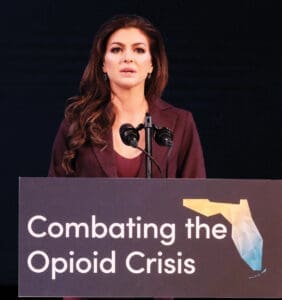By Doug Stauffer
 The governor, first lady, and guests gathered for an Opioid Crisis press conference in Destin recently. Gov. Ron DeSantis has directed the Florida Department of Health, the Florida Department of Children and Families, and the Agency for Health Care Administration to partner together to implement a network of addiction care.
The governor, first lady, and guests gathered for an Opioid Crisis press conference in Destin recently. Gov. Ron DeSantis has directed the Florida Department of Health, the Florida Department of Children and Families, and the Agency for Health Care Administration to partner together to implement a network of addiction care.
There were more than 8,000 overdose deaths in Florida in 2022. Many families are devastated, and society must implement ever more drastic measures. Successful legal action brought by the DeSantis administration against the pharmaceutical manufacturers has opened the doors to settlement funds in excess of $200 million. Those funds are being rolled out throughout the state to aid the fight against opioid addiction. They also focus on education concerning the dangers of fentanyl flowing over the open borders into our streets.
“We want to stop illicit drugs from entering our state, hold dealers accountable, educate Floridians on the dangers and provide treatment that breaks the addiction cycle,” said DeSantis. “Opioid addiction is plaguing our state and nation, and we are seeing more fatalities related to overdose than ever before, with fentanyl being trafficked through the southern border. We will use funds from the opioid settlement in the most efficient and effective way possible to end addiction in Florida.”
The Coordinated Opioid Recovery (CORE) is the first in the United States, placing Florida as a leader in sustainable addiction and opioid recovery. Initially trial tested in 12 counties, the CORE program has expanded to 17 counties statewide. The success rates of the program have proven that it is working. First lady DeSantis premiered a clip from the videos created for high school assemblies.
“The urgency to combat substance abuse is only escalating – we are no longer talking about the drugs from 10 years ago, and the key to protecting our children is prevention,” said Casey DeSantis. “Through ‘The Facts. Your Future,’ materials like what was shown today, and improved substance abuse prevention instruction in schools, students are educated to make decisions that protect their health and see with their own eyes the dangerous impact of illicit drug use. In Florida, we are equipping students with the tools they need to overcome challenges and withstand peer pressure to say no to drug use.”
Standard treatment programs have had limited success in creating long-term recoveries for this lifelong illness. This innovative program is the first of its kind in the country, expanding a state-supported cohesive, coordinated addiction care system for individuals suffering from substance use disorder.
This comprehensive approach expands every aspect of overdose response and treats all primary and secondary impacts of substance use disorder. From care and peer navigators directly within an emergency department to sustainable overall health care, this structure disrupts the revolving door of addiction and overdose.
The network does not solely depend on emergency response for overdoses and substance use disorder, ensuring patients are also stabilized and treated for coexisting medical and mental health conditions. Patients will need dental care, primary care, psychiatric evaluation, maternal care, and social support services. Social support services can address career training, housing, or food insecurity.























































